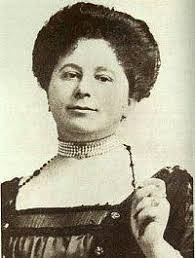About twenty years ago, my
then-boyfriend expressed a longtime wish to read The Scarlet Pimpernel. Soon
thereafter, I was delighted to discover it in a second hand bookstore – but not
so delighted when he ignored me to stay up all night reading it, only to
pronounce it “OK” (but I married him anyway).
Fast forward, as they say, to this past year, when my research into
Edwardian detective fiction unexpectedly brought Baroness Orczy into my life
again.
 Baroness Emmuska (Emma)
Orczy (1865-1947) was the daughter of self-exiled Hungarian nobility. Her marriage with a poorer Englishman, a
fellow art student, was the prompt that drove her to try her talents at writing
novels and plays, often with her husband.
The Scarlet Pimpernel first
came to life as a play that had a long, successful run, and morphed into a
series of about a dozen books. In fact,
I was surprised to find that the total of her short story collections and
novels (not counting plays, translations etc.) numbers more than 60 and includes
mysteries, detective fiction, romance and adventure, often within the wider
genre of historical fiction. Her success
enabled her to buy villas in Italy and Monte Carlo, where she lived after WWI
until the death of her husband after fifty-some years of marriage – and yet,
though many people have heard of The
Scarlet Pimpernel, very few could name its author, let alone any other
works by her.
Baroness Emmuska (Emma)
Orczy (1865-1947) was the daughter of self-exiled Hungarian nobility. Her marriage with a poorer Englishman, a
fellow art student, was the prompt that drove her to try her talents at writing
novels and plays, often with her husband.
The Scarlet Pimpernel first
came to life as a play that had a long, successful run, and morphed into a
series of about a dozen books. In fact,
I was surprised to find that the total of her short story collections and
novels (not counting plays, translations etc.) numbers more than 60 and includes
mysteries, detective fiction, romance and adventure, often within the wider
genre of historical fiction. Her success
enabled her to buy villas in Italy and Monte Carlo, where she lived after WWI
until the death of her husband after fifty-some years of marriage – and yet,
though many people have heard of The
Scarlet Pimpernel, very few could name its author, let alone any other
works by her.
The reason is the one
that, perversely, interests me so much in these forgotten classics: she was
popular. Her works are not great
literature; they are written to entertain and to catch at the feelings of the
time, even when her setting is historical.
The Scarlet Pimpernel (1903),
though set in the French Revolution, echoes the unrest between classes that had
driven Orczy’s own family into exile, and would soon sweep across Russia. Her detective novels explore the
relationships not only of class but gender.
Lady Molly, the eponymous heroine of Lady
Molly of Scotland Yard (1910) depends on “feminine intuition” to guess at
solutions to crimes, which she then sets out to prove. She stands in contrast to the logic employed
by The Old Man in the Corner (1909), a
detective who spends his time in a London tea shop, solving crimes merely from
the details brought him by a female reporter.
 Orczy’s work is a treasure
trove for the historical novelist and fun for the literary curious. I enjoyed Lady
Molly for the varied picture it paints, albeit sometimes stereotyped, of
women, particularly women criminals, in the Edwardian period. If you’re interested in a light read that
gives you a flavour of Europe in the early 20th century, then give
Orczy a try. It may tempt you to know
that The Scarlet Pimpernel, Lady Molly of Scotland Yard and several
other of her novels are available as free ebook downloads on manybooks.net. By the way, that second hand copy of The Scarlet Pimpernel still sits on our
bookshelf!
Orczy’s work is a treasure
trove for the historical novelist and fun for the literary curious. I enjoyed Lady
Molly for the varied picture it paints, albeit sometimes stereotyped, of
women, particularly women criminals, in the Edwardian period. If you’re interested in a light read that
gives you a flavour of Europe in the early 20th century, then give
Orczy a try. It may tempt you to know
that The Scarlet Pimpernel, Lady Molly of Scotland Yard and several
other of her novels are available as free ebook downloads on manybooks.net. By the way, that second hand copy of The Scarlet Pimpernel still sits on our
bookshelf!
I've read The Scarlet Pimpernel a long time ago, but I've never read her other works. I'll have to check her out. Thanks for the recomendations.
ReplyDelete